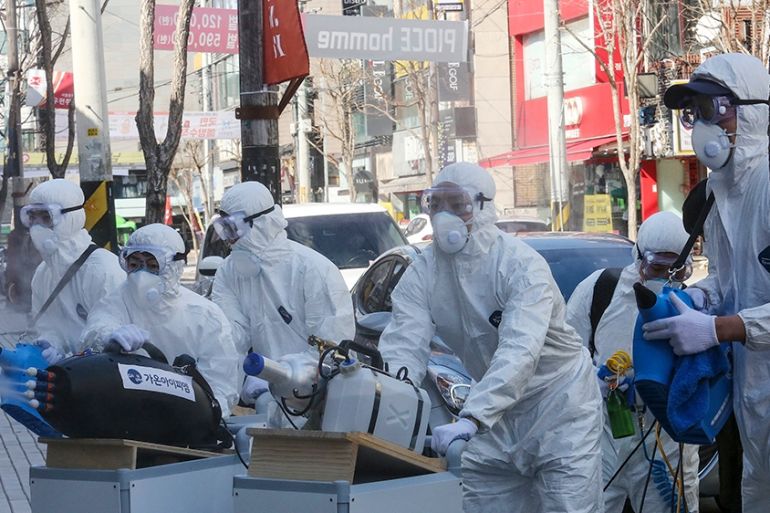Outbreak of fear: Dow plunges at open, extending brutal rout
Growing recession risks send global share prices falling as the coronavirus outbreak upsets economic activity.

Investors continued to flee stocks to safe-haven assets on Friday, as countries on three continents reported their first cases of the coronavirus, heightening the threat of a global recession.
On Wall Street, the Dow Jones Industrial Average plummeted 495 points, or 1.92 percent, at the open of trading in New York, extending a brutal rout that saw the index nosedive nearly 1200 points on Thursday – its biggest one day point drop ever.
Keep reading
list of 3 itemsFacebook cancels annual conference as virus fears rattle firms
Coronavirus outbreak ‘getting bigger’: All the latest updates
The S&P 500 opened down 61.86 points or 2.08 percent. The broad index – often seen as a proxy for retirement accounts in the United States – marked its fastest correction in history on Thursday after outbreak fears wiped nearly $3 trillion off the combined market value of the companies comprising it this week.
The Nasdaq Composite Index shed 296.7 points at the open of trading, or 4.46 percent.
Share prices are on track for the worst week since the financial crisis in 2008 as virus-related disruptions to international travel and supply chains fuelled fears of a contraction in economic growth in the US and Europe.
A recession is defined as six months, or two consecutive quarters, of negative economic growth.
Globally, shares have lost nearly $6 trillion in value this week as investors bail out of stocks and take shelter in assets seen as safe havens during times of rising uncertainty, like gold, bonds and select currencies.
A bellwether signal of recession – an inverted yield curve on US treasury bonds – continues to deepen.
Expectations are rising that the US central bank, the Federal Reserve, could cut interest rates when policymakers meet next month, and that other central banks could follow suit and lower borrowing costs to stimulate economic activity.
Mainland China – where the novel coronavirus originated late last year – reported 327 new cases, the lowest since January 23, taking its tally to more than 78,800 cases with almost 2,800 deaths.
But four more countries reported first cases taking the number of countries with infections outside China to 55, where about 3,700 cases have killed about 70 people. Countries other than China are accounting for about three-quarters of new infections.
An Italian man who arrived in Nigeria this week was confirmed as the first coronavirus case in Africa’s most populous country. And a person who returned on a flight from Iran became the first in New Zealand.
In Eastern Europe, Belarus and Lithuania reported their first cases.
World Health Organization (WHO) Director General Tedros Adhanom Ghebreyesus said all nations should prepare.
“This virus has pandemic potential,” Tedros said in Geneva on Thursday. “This is not a time for fear. This is a time for taking action to prevent infection and save lives now.”
‘Pandemic’ a trigger
Moody’s Analytics on Thursday said a “pandemic” would trigger global and US recessions in the first half of the year and boosted the odds of that scenario happening to 40 percent from 20 percent.
In Asia, investors are bracing themselves for potential bear markets in Indonesia and the Philippines while Malaysia’s key stock market index has been in bear territory since the start of the week due to political turmoil.
In Europe, France’s number of reported cases doubled, Germany warned of an impending epidemic and Greece, a gateway for refugees from the Middle East, announced tighter border controls.
The death toll in Italy, Europe’s worst-hit country, rose to 17 and the number of people who tested positive for the illness increased by more than 200 to 655.
Germany has about 45 cases, France about 38 and Spain 23, according to a Reuters count.
Tedros told reporters in Geneva that Iran, Italy and South Korea were at a “decisive point” in their efforts to prevent a wider outbreak.
South Korea has the most cases outside China, and reported 256 new infections on Friday, bringing its total infections to 2,022.
The head of the WHO’s emergency program, Dr Mike Ryan, said Iran’s outbreak may be worse than realised. It has suffered the most deaths outside China – 26 from 245 reported cases.
Olympics in limbo
Japan is scheduled to host the 2020 Olympics in July but the Ryan said discussions were being held with organisers about whether to go ahead.
As of Friday, confirmed cases in Japan topped 200, with four deaths, excluding more than 700 cases and four more deaths from a quarantined cruise liner, Diamond Princess.
Japan has told schools to close and said big gatherings should be scrapped or curtailed, while pledging the Games will go ahead.
Tokyo Disneyland will be closed from Saturday to March 15, its operator said, leaving all of Walt Disney Co’s theme parks in Asia temporarily shut.
The coronavirus has played havoc with global aviation and tourism as airlines cancel flights, countries ban visitors from hot spots and nervous passengers put off travel.
California-based Facebook Inc said it would cancel its annual developer conference and Microsoft Corp withdrew from a gaming conference.
Scientists warn that much remains unknown about the virus, which can lead to pneumonia, and say a vaccine could take up to 18 months to develop.